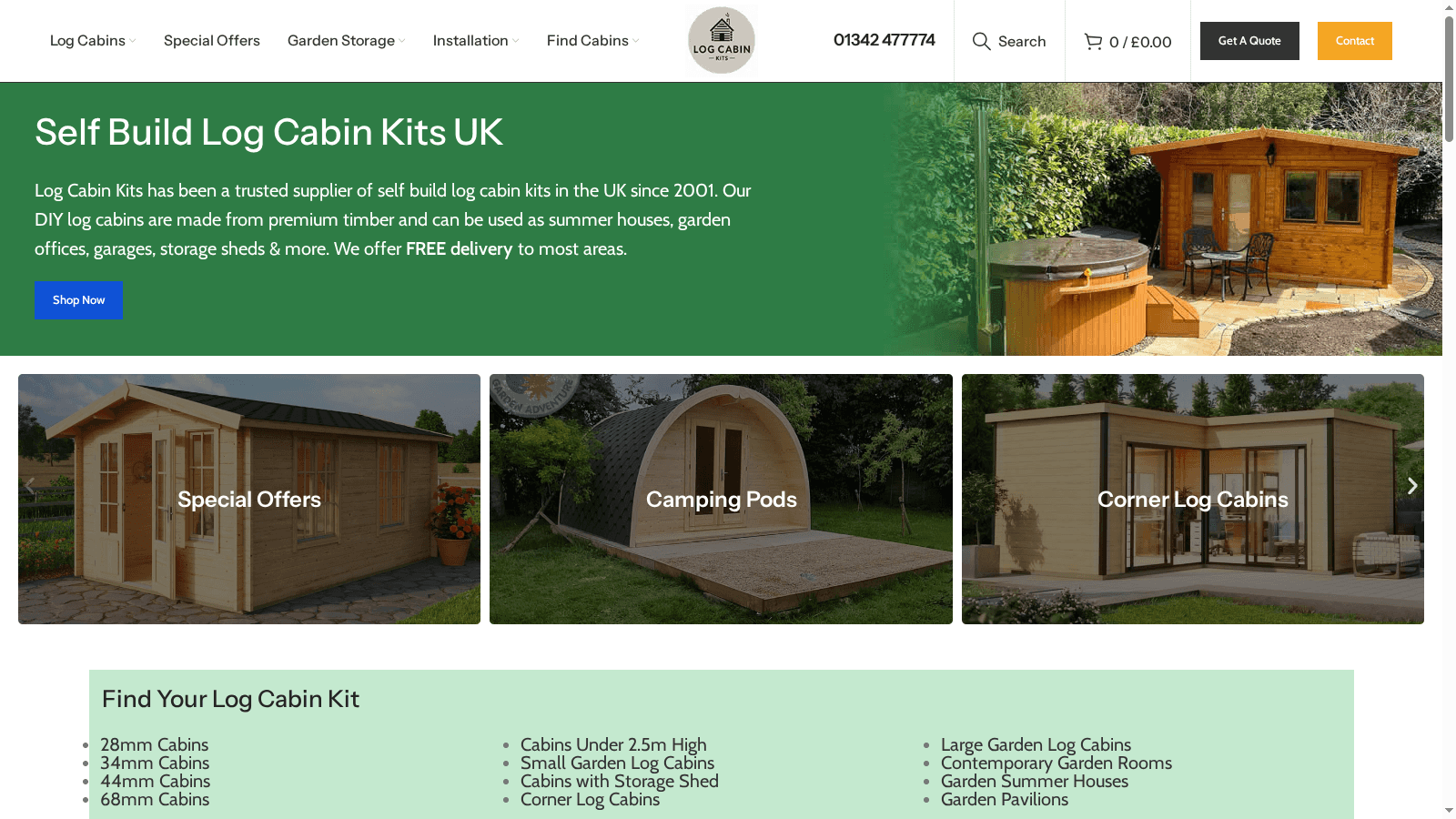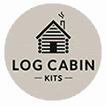Blog
Call Now 01342 477774
Log Cabins: Complete Guide to Supplier Differences

Over half of british homeowners say they are drawn to garden log cabins for their mix of style and utility. These classic timber structures do more than add rustic charm to the landscape. Their clever design lends itself to uses ranging from quiet garden retreats to practical home offices. Whether you are looking for comfort, sustainability, or a fresh take on outdoor living, discovering what sets a log cabin apart helps you make the most of your space.
Table of Contents
- What Defines A Log Cabin And Its Uses
- Types Of Log Cabins Offered In The UK
- Construction Methods And Materials Compared
- Supplier Standards, Customisation, And Guarantees
- Price Differences, Extras, And Hidden Costs
- Choosing The Right UK Log Cabin Supplier
Key Takeaways
| Point | Details |
|---|---|
| Log Cabin Versatility | Log cabins serve multiple functions, from residential spaces to garden retreats, showcasing their adaptability to modern needs. |
| Construction Methods | Understanding different construction methods, such as interlocking logs and modular panels, is crucial for optimal durability and performance. |
| Supplier Evaluation | Thoroughly researching suppliers based on expertise, product range, and customer support is essential for making an informed investment. |
| Cost Considerations | Beyond the initial price, homeowners should account for additional expenses like site preparation and ongoing maintenance to ensure comprehensive budgeting. |
What Defines a Log Cabin and Its Uses
A log cabin represents more than just a wooden structure – it’s a timeless architectural design that combines rustic charm with functional living space. According to Wikipedia, log cabins historically served multiple purposes, from primary residences to temporary shelters and hunting lodges, reflecting their versatility across different cultures and environments.
Traditionally, log cabins are constructed by stacking horizontal timber logs interlocked at the corners, creating a robust and naturally insulated living space. These structures offer unique characteristics that set them apart from conventional buildings:
- Exceptional thermal regulation
- Natural sound insulation
- Strong connection to natural surroundings
- Remarkable durability
- Environmentally sustainable construction
In modern contexts, log cabins have evolved far beyond their original pioneering roots. Today, they serve diverse functions from garden retreats and home offices to full-time residential dwellings and holiday accommodations. Appreciating The Simplicity And Tranquility Of Your Log Cabin highlights how these structures provide a sanctuary from modern urban pressures, offering a unique blend of aesthetic appeal and functional design.
Whether you’re considering a compact garden studio or a spacious countryside retreat, log cabins represent a flexible architectural solution that adapts to contemporary lifestyle needs while maintaining a deep connection to traditional craftsmanship. Their enduring popularity stems from an ability to merge natural beauty with practical living spaces, making them an increasingly attractive option for those seeking both comfort and character in their environment.
Types of Log Cabins Offered in the UK
The United Kingdom offers a diverse range of log cabin styles tailored to meet various residential and garden requirements. Shop Our Wide Range of Garden Log Cabins reveals the extensive variety available to UK homeowners, ensuring there’s a perfect log cabin solution for every space and purpose.
Typically, UK log cabin suppliers categorise their offerings into several primary types:
- Garden Studios: Compact structures ideal for home offices or creative spaces
- Summer Houses: Open and airy designs perfect for relaxation and entertainment
- Workshop Cabins: Robust structures with extra workspace for hobbyists
- Storage Cabins: Functional designs for secure garden equipment storage
- Multi-Room Cabins: Larger, more complex structures with multiple living areas
Modern log cabins in the UK have significantly evolved from traditional designs. Contemporary Log Cabins for the UK demonstrates how these structures now incorporate sleek architectural elements, advanced insulation technologies, and customisable features that blend seamlessly with contemporary garden landscapes.
When selecting a log cabin, UK homeowners should consider factors such as intended use, available garden space, local planning regulations, and personal aesthetic preferences. Whether you’re seeking a minimalist retreat, a functional workspace, or an additional living area, the UK market offers an impressive array of log cabin designs to transform your outdoor environment and enhance your property’s functionality and visual appeal.
Construction Methods and Materials Compared
Log cabin construction in the UK has evolved into a sophisticated process with multiple approaches to material selection and building techniques. What Is a Log Cabin? Complete UK Garden Guide highlights the intricate considerations that go into creating these versatile structures, emphasising the importance of choosing the right materials and construction method.
The primary construction methods for UK log cabins can be categorised into several key approaches:
-
Interlocking Log Systems
- Solid timber logs stacked horizontally
- Provides excellent natural insulation
- Traditional and most authentic construction method
-
Tongue and Groove Panelling
- Precision-cut wooden panels that slot together
- Smoother exterior finish
- Enhanced weather resistance
-
Modular Panel Construction
- Pre-fabricated sections assembled on-site
- Faster installation
- More flexible design options
Materials play a crucial role in determining a log cabin’s durability and performance. Typically, UK suppliers focus on premium timber types such as Nordic spruce, cedar, and pressure-treated pine. Each material offers unique characteristics:
| Timber Type | Durability | Insulation | Weather Resistance | Aesthetic Appeal |
|---|---|---|---|---|
| Nordic Spruce | High | Excellent | Good | Natural, light colour |
| Cedar | Very High | Good | Excellent | Rich, warm tones |
| Pressure-Treated Pine | Moderate | Good | Very Good | Versatile appearance |
The choice of construction method and materials directly impacts a log cabin’s longevity, thermal efficiency, and overall performance. Homeowners should carefully consider their specific requirements, budget, and intended use when selecting the most appropriate approach for their garden or outdoor space.
Supplier Standards, Customisation, and Guarantees
The UK log cabin market distinguishes itself through rigorous supplier standards and extensive customisation options. Shop Our Wide Range of Garden Log Cabins underscores the importance of understanding the nuanced differences between providers and their unique approaches to manufacturing and customer service.
Key aspects of supplier standards typically encompass:
-
Quality Control Processes
- Timber grade verification
- Precision manufacturing techniques
- Comprehensive material inspections
-
Customisation Capabilities
- Bespoke size adjustments
- Multiple finish options
- Personalised interior configurations
-
Warranty and Guarantee Structures
- Structural integrity warranties
- Weather resistance guarantees
- Manufacturing defect protections
Top-tier UK log cabin suppliers differentiate themselves through comprehensive customer support frameworks. Contemporary Log Cabins for the UK highlights how modern providers offer end-to-end services, from initial design consultation through to post-installation support.
When evaluating potential log cabin suppliers, homeowners should conduct thorough comparisons across critical dimensions. Considerations should include warranty length, customisation flexibility, material sourcing transparency, installation support, and after-sales service quality. A comprehensive assessment ensures not just a product purchase, but a long-term investment in a versatile and high-quality garden structure that meets individual lifestyle and aesthetic requirements.


Price Differences, Extras, and Hidden Costs
Navigating the financial landscape of log cabin purchases requires careful consideration of multiple pricing factors. What Is a Log Cabin? Complete UK Garden Guide emphasises the complexity of log cabin pricing beyond the initial purchase price.
Typical cost components for log cabins include:
-
Base Structure Pricing
- Basic material costs
- Standard design configurations
- Fundamental construction expenses
-
Additional Expense Categories
- Foundation preparation
- Delivery charges
- Installation fees
- Electrical and plumbing connections
- Roof and floor upgrades
-
Potential Hidden Costs
- Planning permission fees
- Site preparation expenses
- Ongoing maintenance requirements
- Potential utility connection charges
Contemporary Log Cabins for the UK reveals that modern log cabin pricing strategies typically range from budget-friendly basic models to premium custom designs, with prices varying significantly based on complexity and specifications.
Smart buyers should create a comprehensive budget that extends beyond the initial purchase price. This approach involves calculating potential long-term expenses, including maintenance, potential upgrades, and operational costs. Understanding the full financial commitment ensures that homeowners can make informed decisions, balancing their aesthetic and functional desires with practical financial considerations.
Choosing the Right UK Log Cabin Supplier
Selecting the ideal log cabin supplier demands a strategic approach that balances quality, expertise, and value. Need A Garden Log Cabin. Check Out The Best Supplier In The UK emphasises the critical importance of thorough research and careful evaluation when making this significant investment.
Key criteria for assessing potential log cabin suppliers include:
-
Technical Expertise
- Depth of manufacturing knowledge
- Years of industry experience
- Technical design capabilities
-
Product Range
- Diversity of cabin styles
- Customisation options
- Quality of base materials
-
Customer Support
- Consultation quality
- Installation services
- Post-purchase support
- Warranty provisions
Why We’re the UK’s Best Log Cabin Supplier suggests that top-tier suppliers differentiate themselves through comprehensive service offerings that extend far beyond the initial product sale.
Ultimately, homeowners should prioritise suppliers who demonstrate transparency, provide detailed consultations, and offer end-to-end support. This approach ensures not just a product purchase, but a partnership that supports your garden building project from initial concept through to final installation and beyond. Careful comparison, requesting multiple quotes, and thoroughly reviewing past customer experiences will help identify a supplier capable of transforming your garden vision into a remarkable reality.
Discover Your Perfect Log Cabin Solution with Expert Support
Choosing the right log cabin supplier can feel overwhelming given the many factors such as quality, customisation, pricing transparency and reliable warranties detailed in the article. If you want to avoid hidden costs and ensure your garden cabin matches your lifestyle needs, it helps to work with a trusted provider who offers tailored options and clear guidance every step of the way.
Unlock the full potential of your outdoor space by exploring bespoke and customisable garden buildings available at Log Cabin Kits. Our wide range ensures you find exactly the style and quality that fits your vision with no surprises. Learn more about our dedicated garden log cabins that combine traditional craftsmanship with modern innovation and warranty-backed durability.

Ready to make your log cabin dreams a reality with confidence? Visit https://logcabinkits.co.uk today to explore our unique collections and enjoy expert support from design to installation. Do not wait because improving your garden should be effortless and exactly as you imagine it.
Frequently Asked Questions
Log cabins can be categorised into several primary types, including garden studios, summer houses, workshop cabins, storage cabins, and multi-room cabins, each serving different residential and garden requirements.
Log cabins are typically constructed using interlocking log systems, tongue and groove panelling, or modular panel construction, each offering unique advantages in terms of insulation, finish, and installation time.
Common timber types for log cabins include Nordic spruce, cedar, and pressure-treated pine. Each type has different characteristics regarding durability, insulation, weather resistance, and aesthetic appeal.
When assessing a log cabin supplier, consider their technical expertise, the diversity of their product range, customer support quality, warranty provisions, and the thoroughness of their quality control processes.
